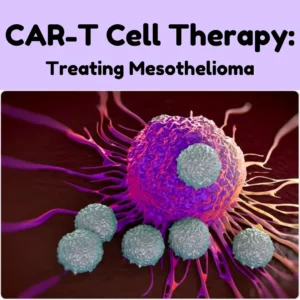Key takeaways: Clinical trials using programmed T cells—which are one of the main immune cells—to target and kill mesothelioma tumors are yielding positive results. This is called CAR-T cell therapy, which is a type of immunotherapy. Although there are significant challenges barring CAR-T cell therapy from becoming mainstream, the fact that a.) its clinical trials are safe and effective; and b.) it’s relatively noninvasive still make it an attractive option.

What is CAR-T Cell Therapy?
CAR-T cell therapy has been in approved clinical trials for blood cancers, and its use has been recently extrapolated to mesothelioma. Healthy T cells play a critical role in the anti tumor capacities of the immune system; in the development of cancer, though, these capacities are usually defunct. Beyond anti tumor capacities, T cells are also responsible for “remembering” different types of pathogens and coordinating the large-scale immune response. These are just a few of the functions of T cells—they’re absolutely critical for any kind of immune response, so it makes sense to focus attention on them in the conceptualization of new mesothelioma treatments. So, because research has established defunct T cells as a factor affecting mesothelioma growth, T cells have become a target for treatment. CAR-T cell therapy is a type of immunotherapy, meaning that doctors use patients’ own immune systems to fight the cancer. In this case, patients’ T cells are externally “programmed” to recognize mesothelioma cells as pathogens. Then, the T cells are reintroduced into the body. From there, they a.) directly attack mesothelioma cells; b.) coordinate a synchronous attack on mesothelioma cells; and c.) will “remember” mesothelioma cells in case they return. This makes CAR-T cell therapy a fantastic option for patients that might not respond well to surgery or chemotherapy: it’s relatively non-invasive, doesn’t damage healthy cells, and has manageable side effects.
Is This Therapy Viable, Long-Term?
Clinical trials are underway for CAR-T cell therapies, with most complete trials yielding positive results. One of the most significant challenges facing clinical trials is the hostile microenvironment of mesothelioma tumors: these microenvironments are markedly immunosuppressive, in that they prevent the infiltration of any immune cells. So, researchers have to establish ways to either reduce this immunosuppression or engineer T cells to persist beyond it. Another challenge is that T cells are susceptible to fatigue, meaning that researchers need to establish a way to keep these cells “energized” enough to completely kill mesothelioma cells.
Mesothelin, which is a protein responsible for controlling cellular growth and division, is overexpressed in most mesothelioma patients. It’s considered to be a biomarker of mesothelioma, or a quantifiable biological product that can help confirm a mesothelioma diagnosis. Mesothelin-based CAR-T cell therapy is a popular clinical trial, as it helps to mitigate local immunosuppression during the T-cell re-introduction. The University of Pennsylvania has piloted anti-mesothelin CAR-T cell therapy clinical trials, and their results are promising: they’ve established mesothelin-based CAR-T cell therapy as safe.
What Can This Show us About the Future of Treatment?
Clinical trials have yielded mixed results, with some reporting stability in tumor size and others reporting no significant changes in patient condition. Improvements in preventing T cell fatigue
and reducing hostile local environments will hopefully make this treatment even more viable, considering its ability to be successful for many patients. The more that scientists understand about mesothelioma—how immunosuppression is enabled by tumors, what other biomarkers might exist for mesothelioma, how mesothelioma tends to grow—the more that these therapies will improve.
If you or a loved one has been diagnosed with mesothelioma, please call The Halpern Law Firm at (800) 505-6000. We are here to help you navigate the legal process of filing a claim to receive compensation for your cancer diagnosis. We help mesothelioma victims and their families in Pennsylvania.
Sources:
https://link.springer.com/article/10.1186/s40364-021-00264-1
https://www.mskcc.org/news/car-cell-therapy-shows-promise-treatment-mesothelioma
https://www.frontiersin.org/articles/10.3389/fcell.2020.00017/full
https://www.ncbi.nlm.nih.gov/pmc/articles/PMC10846312/#:~:text=T%20cells%20attack%20pathogens%20and%20constantly%20scrutinize%20and%20destroy%20tumor%20cells.&text=CPI
%20molecules%20and%20the%20TME,failed%20in%20large%2Dscale%20studies.